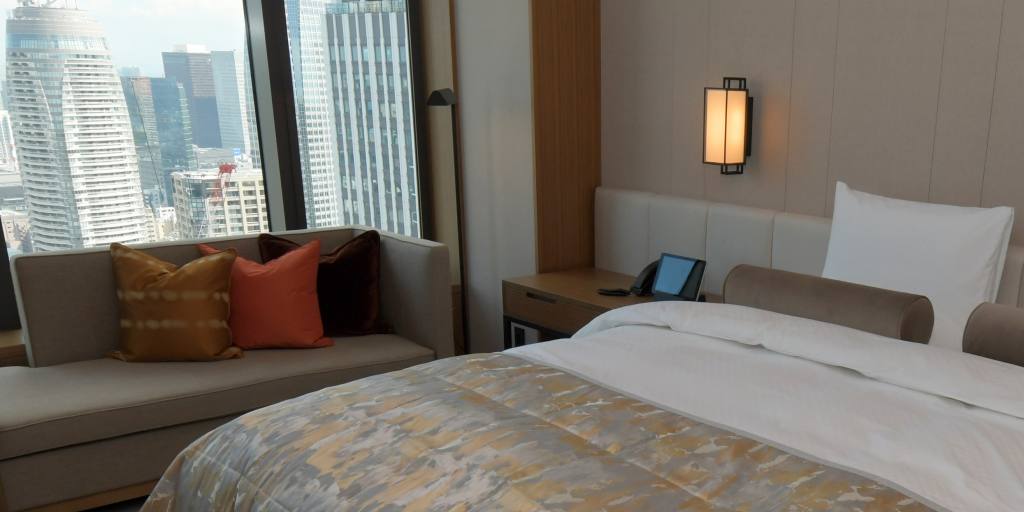TOKYO – the Market for luxury hotels is on the rise in Japan, fueled by the influx of foreign tourists ahead of the Olympic games in Tokyo next year.
Experts say the luxury hotel market in Japan is still underdeveloped compared to its Asian neighbors and the West, but there are signs of change. Wealthy travelers in Japan have long attracted the attention of foreign hotel operators. Now the leading domestic companies are entering the battle.
Tokyo’s Okura, considered by many to be one of Japan’s top three hotel brands, reopened on Thursday after a four-year renovation that costs about 110 billion yen ($1 billion). The hotel has opened a new heritage wing, with rooms going for $650 a night, on average, more than three times the rate of the old hotel.
The Heritage wing of the hotel has 140 rooms with an area of almost 60 square meters each, complete with butlers. Guests can check-in and out of the hotel from their rooms. On the other hand, in the tower Prestige is a commercial office space, Banquet rooms and fitness center. A very favorite main lobby of the old hotel Okura has been recreated. In total, the new Okura hotel has 508 guest rooms. The company hopes to fill two-thirds of them with rich foreign visitors, compared to 60% in the old hotel.
Okura, Imperial Hotel Tokyo and New Otani Tokyo were three major players in Japan’s prestigious hotel market after world war II. Foreign hotel chains entered Japan in the 1990s, established themselves as market leaders with luxurious decor and extensive amenities.
According to the Tokyo Metropolitan government, there are about 3,000 hotels in the capital. Forbes Travel Guide 2019 gave a five-star rating to just five properties. Of these, only the Palace Hotel Tokyo, opposite the Imperial Palace, is owned by the Japanese.
According to Tomohiko Sawayanagi, head of JLL’s Japanese hotels and hospitality group, JLL’s real estate services company, it is difficult for Japanese hotel operators to compete in the luxury segment. “The properties are still old and this is a disadvantage compared to newly developed hotels,” such as those operated by foreign brands, he said.
The predecessor of the revamped Okura, for example, was built in 1962 and its rooms were only just over 30sqm, making them difficult to price by the international luxury standard. “The lack of customer loyalty programs also makes it difficult to keep wealthy international guests in their networks,” Sawayanagi said.
The typical luxury hotel guest has shifted in recent decades as well. China and India have far more affluent travelers these days, but many Japanese hotel operators continue to offer services tailored to domestic customers, closing restaurants quite early, for example.
“New hotels are useful in terms of facilities as buildings become obsolete after a few years,” said Toshihiro Ogita, President of Okura hotel. To compete with overseas operators, Ogita insisted on providing services based on Japanese hospitality concepts.
Many luxury hotels will open in Tokyo ahead of the 2020 summer Olympics. Four Seasons will open in Marunouchi’s financial district, along with the first of Marriott International’s luxury hotels in Japan, and Kimpton, a boutique hotel brand run by Intercontinental Hotels Group. Japanese partners will be involved with each of them.
These properties tend to take advantage of the travel boom in Japan. It is expected that in 2020 in 2020 will come a record 40 million visitors in amewou-31 million. The government hopes to increase this number to 60 million by 2030. Almost all of the increase from tourists; the number of business travelers is flat.
The luxury hotel market in Japan as a whole is still underserved. According to another us hotel rating website, the Five Star Alliance, Japan has only 32 five-star hotels, compared to 793 in the US and 137 in China. Japan trails even much less developed countries such as Thailand, with 112 five-star properties, and Indonesia, with 58.
While many luxury rooms are slated to open in Japan, 87% of the rooms added between 2019 and 2021 will be in limited-service hotels that offer multiple services per stay, according to a report released in June by CBRE. The new properties will be aimed mainly at business travelers.
Full-service hotels will make up just 5% of the new offer, the report says. “Japan still has several higher-end and higher-end hotels, indicating significant opportunities for further development in these categories,” cbRE said.
Analysts expect further growth in the luxury hotel market in Japan. “While the pace of inbound tourist arrivals is slowing, the planned number of new, high-end hotel rooms is very limited, providing a stable market environment,” Saipagi said, noting that new projects such as the Four Seasons and Edition have fewer than 200 rooms each.
Sign up for our newsletters to get our best stories delivered straight to your Inbox.
You need a subscription to…

Be the first to comment on "Japan’s tourism boom lures luxury hotel operators"